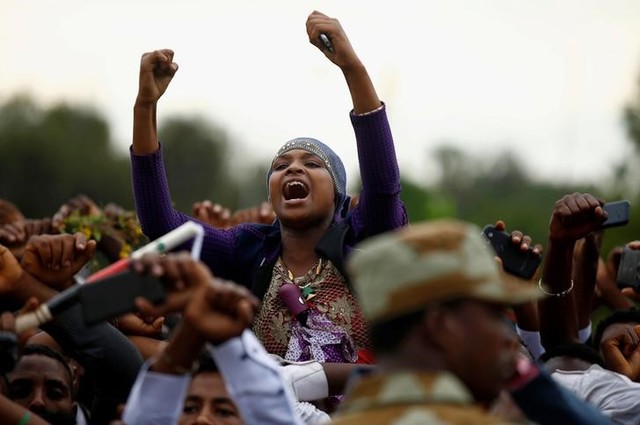Ethiopia joins IC in call for free speech and movement in Somalia as Addis crackdown bites


Ethiopia has joined the international community in calling for respect of freedom of expression and association in Somalia even as arrests in Addis Ababa rise in the upwards of 1,500 and a 25 mile limit of movement for foreign diplomats imposed in the 6 month state of emergency which came into force this month.
In a joint statement with the UN, US, EU, regional bloc IGAD among others, Ethiopia condemned the crackdown of the opposition noting the move was tantamount to a fair and credible electoral exercise.
“International partners condemn the harassment, arrest, and killings of journalists and media personnel in Somalia. We note with great concern what appears to be a growing trend curtailing freedom of expression – be it media reporting, public assembly, or the rights of candidates to campaign,” the international community said in a joint statement.
Media crackdown
Al Jazeera journalist Hamza Mohamed and Xog-ogaal newspaper editor Abdi Guled were detained and released without charges this past week by intelligence authorities in Mogadishu. A report by the UN Assistance Mission in Somalia, UNSOM in September said at least five journalists have been killed this year with little or no investigations. A further 16 journalists and media actors have been arrested since August, with six arrested in October alone and three media houses have been raided and shut down in the recent weeks.
The international community further noted it was disturbed by the interference of political activities in the country citing the ban imposed on political meetings without clearance by Interior Ministry and ban on media from accessing the airport compound in Mogadishu.
The trend, the international community said seemed to be indicative of a calculated move aimed at silencing the opposition. While authorities cite security concerns, only political activities of opposition groups seem to have been affected by such restrictions, they noted.
State of emergency
The joint statement appears to fly in the face of enhanced curtailment of freedom of association and expression by Ethiopian government which has sought to further impose stricter measures in an already thinning space of media freedom and association.
At least 1,600 people have been arrested in the past two days while 500 others are reported to have died during the 11 month anti-government protests.
Besides the ban on foreign diplomats travelling more than 25 miles outside the capital Addis Ababa, authorities have further put a ban on watching television stations set up by Ethiopians abroad.
The U.S. State Department urged U.S. citizens on Friday to defer all non-essential travel to Ethiopia following the ongoing unrest in the Horn of Africa nation.
Ethiopia however joined the international community Friday in calling for free speech and association in Somalia especially during the ongoing elections which will culminate in the election of a new president November 30.
“International partners call on Somali authorities and all actors to allow all Somali citizens to practice and benefit from their rights of free expression and association, take immediate steps to protect the safety and the rights of journalists to operate in Somalia, and ensure in the coming weeks an enabling environment for public participation in discourse linked to the democratic transition, as a contribution to a more democratic and inclusive process,” the international community added.